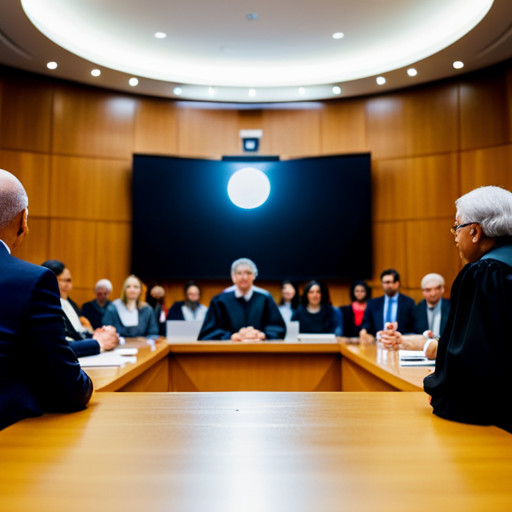Colorado’s Complex Battle for Justice in Wrongful Death Cases
Navigating wrongful death cases in Colorado's intricate legal landscape poses significant challenges. This article delves into the complexities of these cases, distinguishing between survival and wrongful death actions, and detailing the process of establishing negligence. It highlights the constraints imposed by damage caps and statutes of limitations, and guides the reader through the difficult journey of seeking justice in the wake of a devastating loss.

Key Takeaways
- Wrongful death cases in Colorado require proving negligence and navigating through probate court.
- There are two types of wrongful death cases: survival actions and wrongful death actions, which compensate for different damages.
- Damages recoverable in wrongful death cases include economic and non-economic damages, as well as funeral and medical expenses.
- Parties that can be sued in wrongful death cases in Colorado include individuals, companies, and even the government, with some exceptions.
Unraveling the Intricacies of Wrongful Death Cases in Colorado
The current discussion revolves around the intricacies of navigating a wrongful death case in Colorado, an endeavor that requires an in-depth understanding of the state's negligence laws, the complexities of probate court, and the stringent deadlines for filing claims. A thorough exploration of legal precedents in Colorado wrongful death cases reveals a landscape fraught with complexities, where the burden of proof lies heavily on the plaintiff. The role of expert witnesses in proving negligence becomes pivotal as they provide objective, factual analysis essential for establishing liability. These experts offer technical insights into the circumstances leading to the death, supporting the attorney's arguments for negligence. Therefore, in navigating the complex legal terrain of wrongful death cases in Colorado, understanding the state's negligence laws, probate court proceedings, and claim filing deadlines is crucial.
Comprehending the Nature of Wrongful Death Claims
In an effort to comprehend the nature of wrongful death claims, one must consider three primary components: the legal basis for the claim, the parties involved, and the types of damages that can potentially be recovered. The legal basis often rests on proving negligence, a task requiring thorough evidence that the defendant breached a duty of care, causing the death. Parties involved can range from individuals to corporations, dictated by who the plaintiff believes is responsible for the loss. Damages, both economic and non-economic, provide compensation for loss, including lost earnings, benefits, and emotional support. Understanding these elements is vital, as they form the foundation of wrongful death claims and impact the potential compensation recoverable.
Examination of Damages in Wrongful Death Lawsuits
While assessing damages in wrongful death lawsuits, it is imperative to thoroughly examine both economic and non-economic losses, as these significantly affect the compensation awarded to the grieving family. Evaluating compensation involves calculating the deceased's lost earnings, benefits, and potential future income - all part of the economic damages. Non-economic damages, on the other hand, account for the loss of companionship, guidance, and mental anguish suffered by the family. The challenges in proving negligence, a crucial aspect of wrongful death cases, entail demonstrating that the defendant's actions directly led to the loss. This process can be laborious and complex, requiring meticulous evidence gathering and expert testimonies. Therefore, understanding these components is crucial in navigating wrongful death lawsuits.
Identifying Liable Parties in Colorado Wrongful Death Cases
Unraveling the complexities of wrongful death cases in Colorado often hinges on accurately identifying and holding liable parties accountable for their negligent actions. Determining liability is a crucial step and typically involves a comprehensive examination of the circumstances surrounding the death. It requires a thorough investigation, including gathering and analyzing evidence, interviewing witnesses, and consulting with experts. Proving negligence, on the other hand, necessitates demonstrating that the defendant owed a duty of care to the deceased, breached that duty, and that breach directly caused the death. The distinctive interplay between these two elements, liability and negligence, forms the crux of wrongful death cases in Colorado. The process might be arduous, but it's imperative in ensuring justice for the bereaved families.
Understanding the Limitations and Restrictions in Colorado’s Wrongful Death Laws
Although Colorado's wrongful death laws provide a pathway for bereaved families to seek justice after the loss of a loved one, it is essential to understand the inherent limitations and restrictions, including damage caps and strict filing deadlines, that can significantly impact the outcome of these cases. Navigating the legal process and time limits within Colorado's wrongful death laws can be a daunting task, especially when grappling with grief. The role of negligence in Colorado wrongful death cases is crucial as it forms the basis of the claim. However, proving negligence involves meeting specific legal standards, which can be complex. Furthermore, there are caps on non-economic damages and a two-year statute of limitations for filing these cases, adding more layers of complexity to an already challenging process.
Frequently Asked Questions
How Can One Determine if Their Wrongful Death Case Qualifies for Punitive Damages in Colorado?
In Colorado, determining if a wrongful death case qualifies for punitive damages depends on specific criteria. Generally, punitive damages are awarded when the defendant's actions were especially negligent or intentional. This is established using Colorado's legal precedents. However, not all cases are eligible for punitive damages. It's crucial to consult with a legal expert who can assess the specifics of the case against the existing Colorado laws and precedents to provide accurate advice.
What Role Does Colorado’s Probate Court Play in Wrongful Death Cases?
In wrongful death cases, Colorado's Probate Court holds significant power. It oversees the administration of the deceased's estate, which can present complications in these cases. The court ensures that the deceased's debts are paid, assets are distributed correctly, and it also appoints a representative. This representative is key in wrongful death cases, as they are the one who files the civil suit on behalf of the deceased's estate and surviving family members.
How Does Colorado’s Governmental Immunity Act Impact Wrongful Death Cases?
The Governmental Immunity Act in Colorado limits the liability of governmental entities in wrongful death cases. The Act's interpretation often involves discerning whether an immunity exception applies. For instance, dangerous conditions of public property might waive immunity. However, navigating these nuances can be complex. The Act also imposes strict timelines for claims, with a notice requirement of 182 days. Hence, it significantly impacts how wrongful death cases against government entities are handled in Colorado.
Can the Cap on Non-Economic Damages in Wrongful Death Cases in Colorado Be Challenged or Adjusted?
In Colorado, the cap on non-economic damages in wrongful death cases has been a subject of Damage Cap Critique. While the cap is statutory, legal challenges can be mounted if it can be demonstrated that the cap is unjust or unconstitutional. Adjusting Compensation Limits would require legislative action. However, it's important to note that in cases of felonious killing, these caps do not apply, allowing for potentially higher compensation.
What Are the Steps to File a Wrongful Death Lawsuit in Colorado, and How Does the Two-Year Statute of Limitations Affect This Process?
To file a wrongful death lawsuit in Colorado, a representative for the deceased's estate must first retain legal representation due to the necessity of navigating Colorado's jurisdiction complexities. The process involves drafting a complaint, filing it in court, and serving it to the defendant. The two-year statute of limitations starts from the date of death, affecting the timeframe within which the lawsuit must be initiated, otherwise, the right to sue may be lost.
Conclusion
In conclusion, navigating wrongful death cases in Colorado necessitates a comprehensive understanding of its intricate legal landscape. The complexities include distinguishing between survival and wrongful death actions, identifying liable parties, assessing recoverable damages, and acknowledging the impact of the state's non-economic damages cap and two-year statute of limitations. These complexities require seasoned legal professionals to ensure justice is sought effectively and efficiently within the constraints of Colorado's legal system.

This post has been generated by AI and was not reviewed by editors. This is Not legal advice. Please consult with an attorney.




